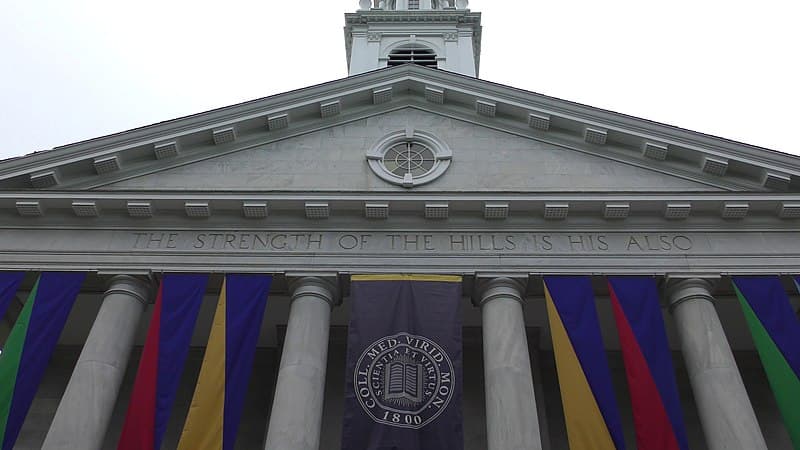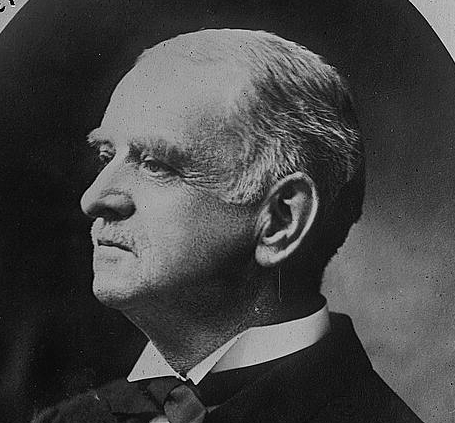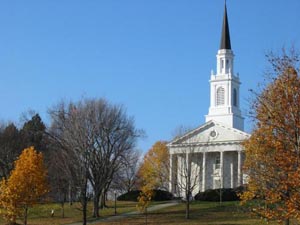How Middlebury College Landed in Court Over the Cancellation of a Former Governor of Vermont and His Gift of a Chapel
The heirs of John Mead are fighting back after the name of the Mead family is chiseled off the iconic architecture that has stood as a symbol of the faith and ideas that once animated the campus.

Last year I related in the Sun how I was skipping my 50th reunion at Middlebury College because of an indignity visited upon one of my predecessors as governor of Vermont. Now I’ve taken the College to court, in an effort to right the wrong done to Governor John Mead.
In late 2021, Middlebury abruptly removed the name “Mead Memorial Chapel” from the house of worship generously furnished by Mead, an alumnus and trustee as well as Vermont’s 53rd governor. It’s wrong on many fronts.
The Governor conditioned his gift on using the name Mead Memorial Chapel, the College has reaped enormous benefits from the Chapel for more than a century, and the cancel culture that led to this act needs to be challenged.
Erasure of Mead’s legacy, based on some remarks in a 1912 speech, is contrary to the College’s policy on free expression and its professed tolerance for unpopular views. It conflicts with the very purpose of an institution of higher learning: to seek knowledge and pursue the truth.
Hence, the filing by the Governor’s estate of a legal challenge. The family has asked me to serve as administrator, and I am honored to accept. I’m confident that a jury, upon examining all the evidence, will recognize the unfairness of this act.
I’ve been gratified by the tremendous support this cause has received from faculty, staff, retirees, and alumni. Many are offended by the unfairness of this act; they recognize the illogic of applying a modern standard to another era.
Mead Memorial Chapel has been the College’s most prominent edifice since 1916. There was no warning that the name would be removed, no public discussion, no hint that such a cancellation was to occur.
Instead, the College issued a statement shortly after the deed was done. It falsely asserted that the Chapel was named for the Governor and his wife; in fact, Governor Mead selected the name to honor his ancestors, among the first settlers of the area.
The basis for the removal of Mead’s name was the Governor’s support for restricting the issuance of marriage licenses to those of limited intellectual capacity and to appoint a commission to study the use of vasectomy as a more humane process of sterilization.
The former practice was passed by the legislature after he left office, but vetoed by his successor. Nonetheless, Mead was proclaimed a eugenicist, and the College implied, without evidence, that he was motivated by racism.

Middlebury’s cancellation of Mead sullies the reputation of a loyal graduate, as well as a generous benefactor. The College exaggerates his role in this matter; he didn’t actually do anything, but merely expressed an opinion.
So the late governor is being punished for his ideas. Middlebury is regulating thought, precisely the opposite of what a liberal arts college should do. Yet Middlebury has benefited from the Chapel extensively since its dedication.
Many campus gatherings have been held there; persons I know have been married in Mead Chapel, and others have been laid to rest following a funeral there. As a student, I attended worship services regularly; sadly, weekly worship no longer occurs.
Middlebury has consistently featured the image of the Chapel in its publications. For it’s the tallest structure on campus and the most distinctive. In 2016, the College website presented a centennial video extolling its value to the College in the previous century.
The College bases its decision to remove the Mead family’s name on inconsistency with its values. Perhaps that’s true: John Mead stood for patriotism, service, family, fairness, education, reverence, and charity. Maybe these are no longer among the values of the institution.
It appears that “presentism” now tops its list: purging someone due to a suggestion that we a century later deem unacceptable. I recently visited Mead’s grave in Rutland, Vermont. On his tombstone is the inscription “A Christian and Philanthropist.” That’s how he wanted to be remembered.
The governor’s gift of Mead Memorial Chapel embodies both attributes. An institution of higher learning is the last place an idea should be canceled. The pursuit of truth and knowledge requires a generous exposure to varied ideas and ideologies. That’s how we prepare students for the future. We must learn from history, not erase it.


